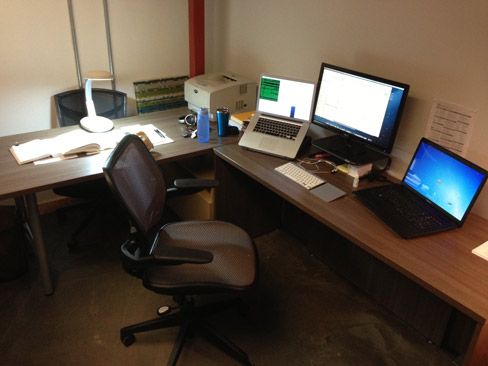I'm Fred Stutzman, the creator of the Freedom app, and THIS IS HOW I WORK

Fred Stutzman is a man who has revolutionized the world of time management. While other gurus were creating complicated systems that take months to get used to, Fred came up with a much simpler and more useful way. He created an app.
The app has been featured in The New York Times, USA TODAY, The NewYorker, The Daily Telegraph, Forbes, The Wall Street Journal, The Guardian, The Financial Times, The Economist and hundreds of other newspapers, magazines and blogs.
And Fred achieved all this publicity without any PR manager or marketing department. The only reason all the big newspapers wrote about him was his brilliant software, which hit the nail on the head.
With his simple app, he helps writers finish their books, stressed out students finish their theses, and managers meet their goals on time and finally get FREEDOM.
I am very happy that Mr. Fred Stutzman agreed to do a short interview with me.
Fred, can you tell us exactly what the Freedom app does?
Thank you for taking the time to interview me. It's an honor. Freedom is a little app that can disconnect people from the Internet simply and efficiently. Nowadays, people are constantly distracted by sites like Facebook or Twitter. It's just that these people still need a computer to get their work done. Freedom locks out all the distractions of the outside world and lets you focus on getting your work done.
So what exactly does Freedom do? It asks you a simple question. "How many hours of freedom do you want?" You enter 2 hours, for example. And for two hours you are completely internet-free. No Facebook, email, Google, Skype, SME.sk, TimeManagement.sk, nothing. Absolutely nothing. Freedom :-)
There are a lot of applications that only disconnect you from certain parts of the web - for example, social networks or sites like topky.sk. It just never worked for me. Even when I used such an app, although I didn't get to YouTube, I found other entertainment. It was only when I completely disconnected from the internet that I was able to finally start working.
You might be thinking... "And isn't it enough to just turn Freedom off when I want to get online?" No, it's not enough. The only way to get online again is to reboot the computer. Only that's annoying. It takes time. And I really don't want to wait for everything to reboot, my system to boot up again, just to look at some stupid website. I'd rather be working.
Freedom allows you to gain freedom. Freedom to work. And it does that by taking away your freedom to go online. Brilliant, right :-)
How did you come up with the idea for this app?
When I was in college, I used to go to a coffee shop that had no internet connection. And I used to go there because of that. Without being able to get on the net, it was a great place to work. But then one day a neighbor of the cafe set up WiFi, and that completely changed the whole cafe. That's when I decided to create Freedom, an app that would give people a way to get rid of internet interference in a world that is hyper-connected.
What other projects do you have besides Freedom?
Besides my academic research, I've created a few other tools. My first startup was an online identity management service called ClaimID. But given the content of this interview, probably the most relevant product is Anti-Social. Anti-Social is similar to Freedom, but unlike the entire Internet, it only disconnects you from sites like Facebook, Twitter, YouTube, etc.
Is there also a Windows version of your app or is it Mac-only for now?
I've created a Windows version of Freedom, but I'm still working on the Windows version of Anti-Social.
What hardware are you using?
I use a MacBook Pro for my daily work. In addition, I have a Toshiba laptop on which I program Windows software. When I need more power, I use Amazon Computing Cloud. For mobile devices, I use an iPhone and an iPad. And I envy people their beautiful Samsung phones ;)
And what software?
For editing - Textmate and vi (I'm not really an emacs guy :-)
For programming - Xcode, Eclipse, Github, SVN, Sequel Pro
For statistics and academic work - R, Stata, Bibdesk, Skim
For everything else - Omnifocus, DevonThink, Pandora One
What does your typical work day look like? When do you get up and when do you go to bed?
I wake up at 5:45am and then work out. My kids get up at 6:45, so I try to use that time to read as well. I read during exercise. I leave for work around 8:30, I'm there until like 5:00 or 6:00. When I get home, it's just dinner time, then playing with the kids, bath time, and bed time. By the time the kids are asleep, I'm usually too exhausted to move at all. But I try to read some more and go to bed at about 10:00-10:30pm.
Is there any app (besides Freedom, of course) that you couldn't live without?
On the computer, it's OmniFocus. On my mobile, a little app called Relax Full, which I use for guided meditation. It's much better than anything else on the Apple App Store. And still the TruboScan app - that one is very useful.
What do you use to plan your tasks, projects and deadlines? Are you more of a fan of new technology or classic paper?
I write a lot on paper, but I end up converting all those notes into digital form. I plan my tasks through OmniFocus. I also like to record my thoughts into a voice recorder on my phone. I guess you could say I'm a little bit "old school" and a little bit "new school" at this.
What does your desk and your office look like?

Do you have a favourite time management tip?
General: Learn to create good email filters. Achieving Inbox Zero is possible as long as you know how to work with email and filters properly.
A bit of self promotion: Use Freedom in short periods of time. When the day comes that work is not going your way, it's great to turn on Freedom for a while (15-30 minutes) and work. This will break the cycle of distractions.
If it were possible, what advice would you give to a 5 years younger version of yourself?
Five years ago, I was studying for my Ph. My advice would be to graduate earlier :)
Thank you for the interview. I really appreciate you taking the time... Is there anything you would like to say to our readers?
I would say two things.
- Finding the right approach to productivity is a highly individual thing. I do research about it and I find that productivity is actually a process. Consider more than just the tools you use. Everything matters - your environment, your mood, etc.
- Don't look at interruptions and distractions as failures, but as a natural human tendency. If computers are distracting us, the problem is with the computers - and it's up to programmers to make computers a better tool that doesn't distract us and allows us to work.
